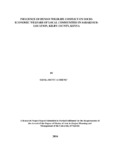| dc.contributor.author | Ojuka, Betty A | |
| dc.date.accessioned | 2016-11-18T07:17:23Z | |
| dc.date.available | 2016-11-18T07:17:23Z | |
| dc.date.issued | 2016 | |
| dc.identifier.uri | http://hdl.handle.net/11295/97529 | |
| dc.description.abstract | Conflicts between human and wildlife have occurred in the world since the dawn of humanity.
These conflicts can cause damage or costs to both. Incidences of crop damage, death of domestic
animals as well as human death can be realized as well as poor performance in schools due to
absenteeism because of fear of being attacked by wild animals. The purpose of this study was to
establish the influence of Human Wildlife Conflict on Socio-economic welfare of local
communities in Sabaki Sub-location. The objectives of the study were to Determine the influence
of land use to human wildlife conflict on socio-economic welfare of local communities in Sabaki
sub-location, to determine the influence of poverty to human wildlife conflict on socio-economic
welfare of local communities in Sabaki sub-location and to determine the influence of Wildlife
Conservation Practice to human wildlife conflict on Socio-economic welfare of local
communities in Sabaki Sub-location. Relevant literature was discussed in this research project
with a view of establishing the gap between this study and other previous related studies. From
the Theoretical perspective, the study used Karl Marx Conflict theory and Foucault’s theory of
the family as a guide to the buildup of the Research. The Literature revealed three important
variables. These were how land use influenced Human Wildlife Conflict on Socio-economic
welfare of local communities, how poverty influenced Human Wildlife Conflict on Socioeconomic
welfare of local communities and how wildlife conservation practice influenced
Human Wildlife Conflict on Socio-economic welfare of local communities. Both primary and
secondary data were used in this study and quantitative methods were used to collect data. Self
administered questionnaires, focused group interviews and observation were used to collect
primary data while secondary data was obtained from documents and publications. Hypotheses
were tested and calculated using Chi-square and all the three Alternative hypothesis were
accepted. All the research questions were answered and the three objectives achieved. The NonGovernmental
Organizations concerned with Environmental conservation projects were
recommended to team up with all the relevant stakeholders and focus on Community based
projects in the studied area so as to promote sustainable wildlife conservation. | en_US |
| dc.language.iso | en | en_US |
| dc.publisher | University of Nairobi | en_US |
| dc.rights | Attribution-NonCommercial-NoDerivs 3.0 United States | * |
| dc.rights.uri | http://creativecommons.org/licenses/by-nc-nd/3.0/us/ | * |
| dc.title | Influence of human wildlife conflict on socioeconomic welfare of local communities in Sabaki sublocation, Kilifi county, Kenya | en_US |
| dc.type | Thesis | en_US |



